Crystalline lattice Study guides, Class notes & Summaries
Looking for the best study guides, study notes and summaries about Crystalline lattice? On this page you'll find 141 study documents about Crystalline lattice.
Page 3 out of 141 results
Sort by
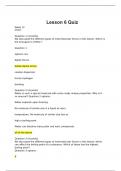
-
CHEM133 Week 13 Lesson 6 Quiz.docx
- Exam (elaborations) • 13 pages • 2023
- Available in package deal
-
- $29.99
- + learn more
1. Question: We discussed the different types of intermolecular forces in this lesson. Which is the strongest in CF2H2 ? 2. Question: Water is such a special molecule with some really unique properties. Why is it so unusual? 3. Question: We discussed the different types of intermolecular forces in this lesson, which can affect the boiling point of a substance. Which of these has the highest boiling point? 4. Question: If you have 2.00 x 103 J of energy, what mass (g) of solid butane (C4H10O) ...
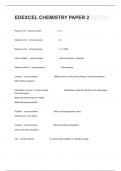
-
EDEXCEL CHEMISTRY PAPER 2 Practice Question Guide.
- Exam (elaborations) • 12 pages • 2024
-
Available in package deal
-
- $12.99
- + learn more
Proton c/m? - correct answer +1, 1 Neutron c/m? - correct answer 0, 1 Electron c/m? - correct answer -1, 1/1500 Mass number? - correct answer Num of protons + neutrons Atomic number? - correct answer Num protons Isotope? - correct answer Different atom of the same element, same num protons. Diff ...
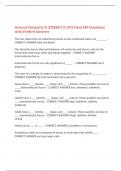
-
General Chemistry II (CHEM113) ACS Final 289 Questions with Verified Answers,100% CORRECT
- Exam (elaborations) • 28 pages • 2024
-
- $11.99
- + learn more
General Chemistry II (CHEM113) ACS Final 289 Questions with Verified Answers The two states that are collectively known as the condensed states are _______. - CORRECT ANSWER solid and liquid The attractive forces that exist between all molecules and atoms, and are the forces that hold many solids and liquids together - CORRECT ANSWER intermolecular forces Intermolecular forces are only significant at _____. - CORRECT ANSWER short distances The state of a sample of matter is determine...
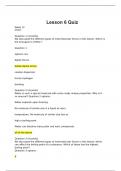
-
CHEM133 Week 13 Lesson 6 Quiz Questions and Answers APU
- Exam (elaborations) • 13 pages • 2023
- Available in package deal
-
- $23.99
- + learn more
1. Question: We discussed the different types of intermolecular forces in this lesson. Which is the strongest in CF2H2 ? 2. Question: Water is such a special molecule with some really unique properties. Why is it so unusual? 3. Question: We discussed the different types of intermolecular forces in this lesson, which can affect the boiling point of a substance. Which of these has the highest boiling point? 4. Question: If you have 2.00 x 103 J of energy, what mass (g) of solid butane (C4H10O) ...
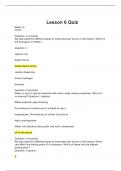
-
CHEM133 Week 13 Lesson 6 Quiz (All Correct)
- Exam (elaborations) • 13 pages • 2023
-
Available in package deal
-
- $25.48
- + learn more
1. Question: We discussed the different types of intermolecular forces in this lesson. Which is the strongest in CF2H2 ? 2. Question: Water is such a special molecule with some really unique properties. Why is it so unusual? 3. Question: We discussed the different types of intermolecular forces in this lesson, which can affect the boiling point of a substance. Which of these has the highest boiling point? 4. Question: If you have 2.00 x 103 J of energy, what mass (g) of solid butane (C4H10O) ...
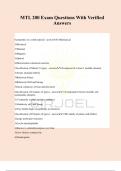
-
MTL 200 Exam Questions With Verified Answers
- Exam (elaborations) • 20 pages • 2024
-
- $13.49
- + learn more
MTL 200 Exam Questions With Verified Answers 6 properties of a solid material - answer1)Mechanical 2)Electrical 3)Thermal 4)Magnetic 5)Optical 6)Deterioration (chemical reaction) Classification of Metals (5 types) - answer1)Composed of at least 1 metallic element 2)Atoms arranged orderly 3)Relatively Dense 4)Relatively Stiff and Strong 5)Good conductors of heat and electricity Classification of Ceramics (4 types) - answer1) Compounds between metallic and nonmetallic elements 2) Co...
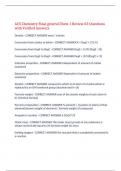
-
ACS Chemistry Final general Chem 1 Review 63 Questions with Verified Answers,100% CORRECT
- Exam (elaborations) • 7 pages • 2024
-
- $11.09
- + learn more
ACS Chemistry Final general Chem 1 Review 63 Questions with Verified Answers Density - CORRECT ANSWER mass / volume Conversion from celsius to kelvin - CORRECT ANSWER K = DegC + 273.15 Conversion from DegF to DegC - CORRECT ANSWER DegC = (5/9) (DegF - 32) Conversion from DegC to DegF - CORRECT ANSWER DegF = (9/5)(DegC) + 32 Intensive properties - CORRECT ANSWER Independent of amount of matter examined Extensive propertires - CORRECT ANSWER Dependent of amount of matter examined...
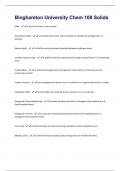
-
Binghamton University Chem 108 Solids Questions + Answers Graded A+
- Exam (elaborations) • 2 pages • 2024
- Available in package deal
-
- $7.99
- + learn more
Alloy - A mixture of two or more metals Amorphous solids - a solid that lacks order and has random or disordered arrangements of particles Atomic solids - A solid formed by the weak attraction between noble gas atoms covalent network solid - A solid formed by covalent bonds among nonmetal atoms in an extended array. Crystal lattice - A 3-dimensional geometric arrangement of the atoms or molecules or ions composing a crystal Crystal structure - the arrangement of atoms, ions, or molecules...
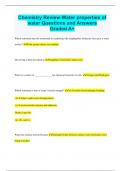
-
Chemistry Review-Water properties of water Questions and Answers Graded A+
- Exam (elaborations) • 13 pages • 2023
- Available in package deal
-
- $9.99
- + learn more
Chemistry Review-Water properties of water Questions and Answers Graded A+ Which statement must be mentioned in explaining why amphipathic molecules line up at a water surface? Polar groups attract one another. Dissolving is best described as mingling of molecules and/or ions. Water is a source of ______________ for chemical reactions in cells. Oxygen and Hydrogen. Which statement is true of water's tensile strength? (a) It results from hydrogen bonding. (b) It helps to pull water through p...
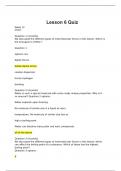
-
CHEM133 Week 13 Lesson 6 Quiz
- Exam (elaborations) • 13 pages • 2023
-
- $22.49
- + learn more
1. Question: We discussed the different types of intermolecular forces in this lesson. Which is the strongest in CF2H2 ? 2. Question: Water is such a special molecule with some really unique properties. Why is it so unusual? 3. Question: We discussed the different types of intermolecular forces in this lesson, which can affect the boiling point of a substance. Which of these has the highest boiling point? 4. Question: If you have 2.00 x 103 J of energy, what mass (g) of solid butane (C4H10O) ...

$6.50 for your textbook summary multiplied by 100 fellow students... Do the math: that's a lot of money! Don't be a thief of your own wallet and start uploading yours now. Discover all about earning on Stuvia


